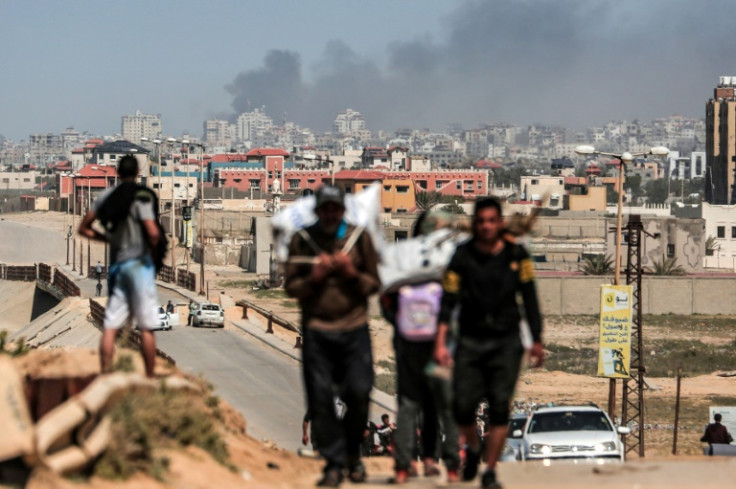
The United States, which has repeatedly blocked calls for a truce in Gaza, will submit a draft resolution to the UN Security Council Friday on the need for "an immediate ceasefire," while Russia pushes for even more explicit demands for peace.
Since the start of the Israeli-Hamas war on October 7, the United States has repeatedly used its UN Security Council veto to block the world body from calling for an immediate ceasefire in the Palestinian territory.
Following their last veto at the end of February, US officials have been negotiating an alternative text focusing on support for diplomatic efforts on the ground for a six-week truce in exchange for the release of hostages.
The latest version, seen by AFP, notes the necessity for "an immediate and sustained ceasefire to protect civilians on all sides, allow for the delivery of essential humanitarian assistance, and alleviate humanitarian suffering."
It thereby supports "diplomatic efforts to secure such a ceasefire in connection with the release of all remaining hostages."
With the United States under strong international pressure to soften its support for key ally Israel, Secretary of State Antony Blinken said Wednesday that the latest resolution sends "a strong signal."
The resolution "does call for an immediate ceasefire tied to the release of hostages, and we hope very much that countries will support that," Blinken said in Saudi Arabia.
However, the text does not explicitly use the word "call," instead simply stating that a ceasefire is imperative, which Russia says is too weak.
"We are not satisfied with anything which doesn't call for an immediate ceasefire," Russian Deputy Ambassador to the UN Dmitry Polyanskiy told reporters Thursday.
Richard Gowan, an analyst at the International Crisis Group, said "the US is still not demanding a ceasefire without preconditions."
But "even this limited shift by the US will worry the Israelis, because (Prime Minister Benjamin) Netanyahu wants to keep the UN out of diplomacy over the war altogether."
According to diplomatic sources, the United States now has enough votes (at least 9 out of 15) for the text to be adopted, but there remains the possibility of a veto by Russia.
US Ambassador Linda Thomas-Greenfield has said that she was "optimistic" for its adoption.
In addition to the ceasefire, the text also "rejects any attempt at demographic or territorial change in Gaza" and also condemns "all acts of terrorism, including the Hamas-led attacks of October 7" against Israel.
If adopted, the resolution would mark the first time the Security Council has specifically condemned the Hamas attack, which resulted in about 1,160 deaths in Israel, mostly civilians, according to an AFP tally of Israeli official figures.
Israel has relentlessly pounded Gaza, where at least 31,988 people, most of them women and children, have been killed, the health ministry in the Hamas-run territory says.
Two humanitarian resolutions that have been adopted by the Council, as well as those in the General Assembly, have not mentioned Hamas, an absence lambasted by Israel.
Several non-permanent Security Council members have circulated their own draft project in recent days which "demands an immediate humanitarian ceasefire for the month of Ramadan" and the immediate release of all hostages, according to a text seen by AFP.
If the US text is rejected, then this draft "will come to the table and put to the vote and I hope it will be adopted," said France's UN Ambassador Nicolas de Riviere, adding that now was the "time to save lives."
However, a vote on that text would have an equally uncertain outcome.
The Council has been largely divided on the Israeli-Palestinian issue for years and has only managed to adopt the two essentially humanitarian resolutions on the topic since October 7.
But even those had little effect: the entry of aid into Gaza remains largely insufficient and famine looms.
Several political resolutions have been rejected by US vetoes on the one hand or Russian and Chinese vetoes on the other -- or by an insufficient number of votes overall.




